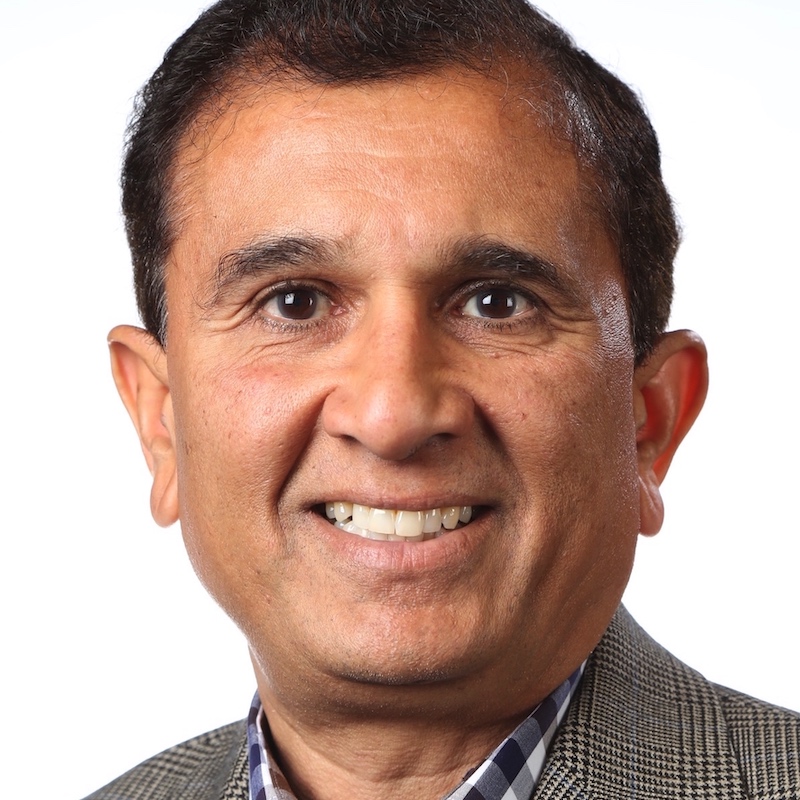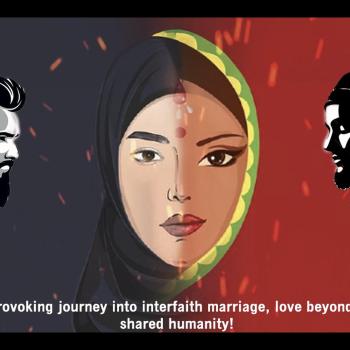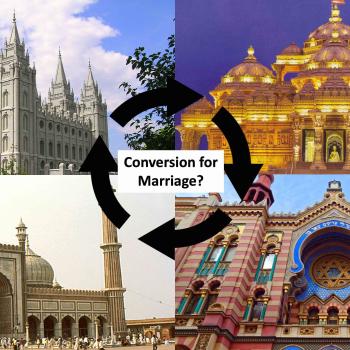Hindu-Jewish Child Custody Court Battle, A Case Study: Wrong expectations and implied understandings are major causes of pain in any marriage, more so in interfaith marriages. Here, the author has used 2022 child custody battle court transcripts to explain potential legal implications in interfaith marriages.
In any interfaith marriage, the most important and difficult question to address is: what will be the ‘formal’ religion of their interfaith children? Sometimes, one of the two parties agrees to convert to the other faith and/or agrees to raise children in the spouse’s faith, just due to their all-inclusive pluralistic mindset. Other times, there is a commitment to raise the children in both faiths, but for various reasons one party agrees to more activities of the spouse’s faith. However, such short-term open-mindedness of religious liberals can work against them later when they decide to go back to their roots. There are clear legal ramifications to your kindness as explained in this article.
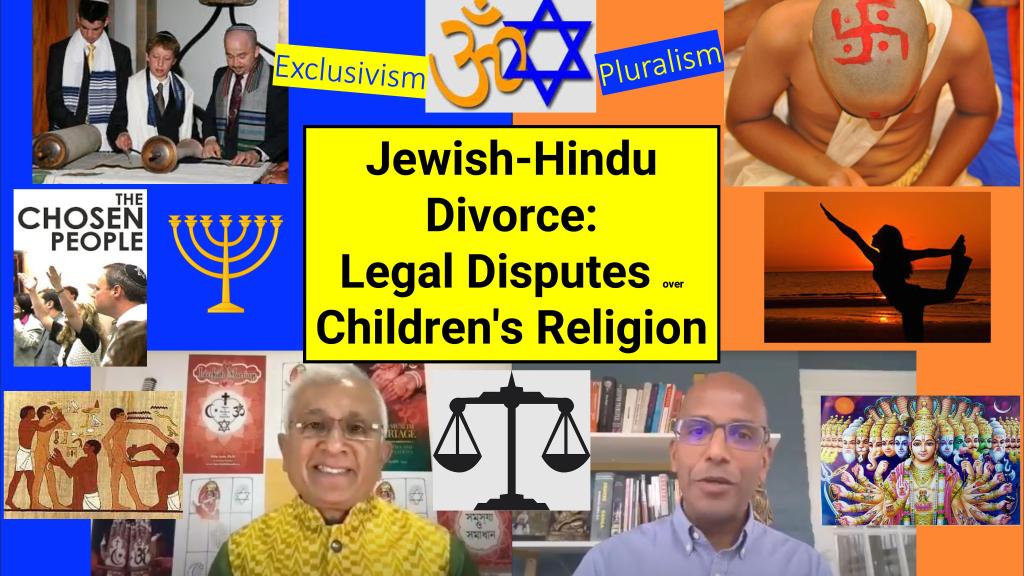
Summary of the legal case
Vijay, an American-born Hindu, married Rachel (names altered), an American-born Jew. They first met in India and, after two years of dating, had a civil marriage in the USA. After six years of marriage and three years of separation, they settled for a divorce. After the divorce, both became more religious. They have two boys with shared custody and a 50/50 parenting time arrangement. These parties again came to court regarding a request to change the allocated time for the children’s religious education. Vijay not only lost the case, but the judge also declared him to be in bad faith and ordered him to pay Rachel’s attorney’s fees.
The author obtained legal documents directly from the New Jersey court system (docket # A-002135-22-T01, Rxxxxx Yxxxxx v. Hxxxx Ixxxxx). The author also interviewed the Hindu American party; the interview is available here.
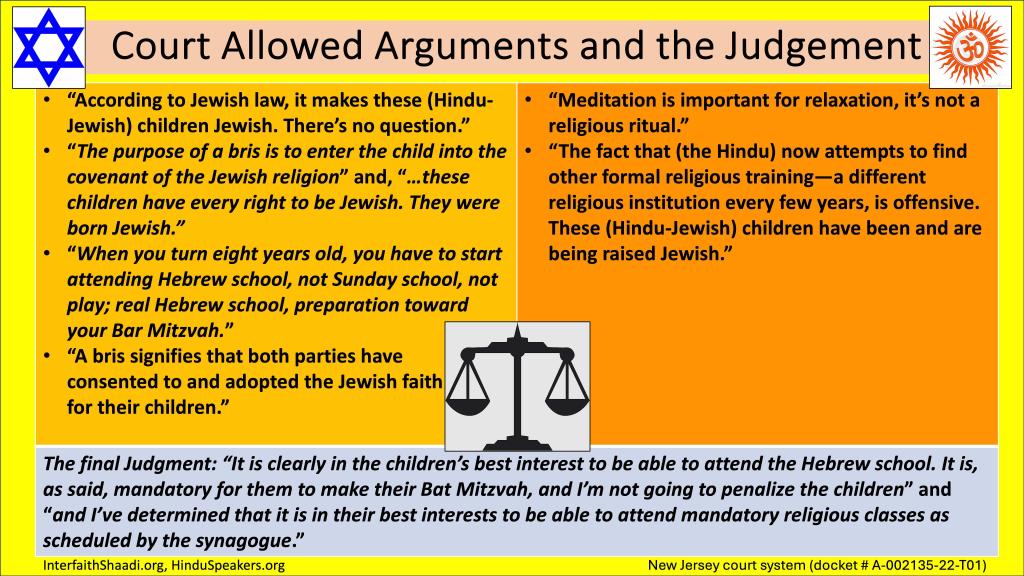
A good start for this Hindu-Jewish couple
The couple had a civil marriage, incorporating rituals and elements from both Hindu and Jewish faiths. They signed a Ketubah (Jewish marriage contract) but did not have a Jewish wedding or a Hindu wedding. Vijay did not convert to Judaism. During her early married life, Rachel was uncomfortable with having a Christmas tree in their home but was comfortable with having a Hindu shrine. They gave both their sons interfaith names, with their eldest son’s first name being Jewish and their younger son’s first name being Hindu, with each son’s middle name representing the opposite religion. The court paper reads, “(Rachel) has always said they are both (children Hindu and Jewish).”
[Author’s views: So far, so good. Apparently, this couple had all intentions of respecting each other’s faiths, and this Jewish-Hindu marriage appeared to be on the right track.]
Mainly Jewish practices followed in early married life
Early in their marriage, the couple attended a nearby conservative synagogue, but with no Hindu mandir near them, they were not part of any Hindu organization nor did they routinely visit any Hindu mandir. At one point, Rachel asked if Vijay wanted to take his Hindu mother to a musical Shabbat, which Vijay happily accepted, saying, “Yes, sure, I’ll take my mother.” Apparently, Rachel was not offered the opportunity to attend any Hindu activities.
At some point in their married life, Vijay talked about enrolling the children at a synagogue with himself in something called Torah Talk.
[Author’s view: For pluralistic non-dogmatic Hindu faith, there is no restriction on taking part in other religious rituals. Enrolling as a ‘member‘ in a synagogue does not take away anything from being a Hindu. Vijay may have even considered attending the Torah talk to enhance his knowledge (Gnana Yoga), an important aspect for a spiritual Hindu.
Furthermore, Hinduism is not a dogmatic religion and can be practiced in any number of ways. Formal practices like regular visits to a Hindu temple are not mandatory. Maintaining a personal connection to God through spiritual practices like meditation is perfectly acceptable and common.
Vijay made a mistake by engaging in more formal, institutional Jewish activities like joining a synagogue, whereas his Hindu activities were informal, from a Judeo-Christian perspective. This behavior could later give the wrong impression to a Judeo-Christian judge that he had embraced Judaism, historically an exclusive religion.]
Confusion about the intent of a session at the synagogue
At one point, Rachel asked Vijay if he wanted to participate in this ‘interfaith group’ with the synagogue, to which Vijay replied, “I’m personally not too interested, but will go if you want me to.” The court transcript later states, “(this program is) not for parties that have two different religions” but for “(this program is) to enhance your family’s Jewish life in the community.”
[Author’s view: Over the past 19 years of his interest in the interfaith marriage field, the author has observed that interfaith married Hindus have no problem attending church, mosque, or synagogue programs specifically designed for newly married interfaith couples, but they don’t realize that such programs are designed to lure the other faith party closer to their own faith. Attending such a program may be construed in court as the outside party being clearly informed about their intentions and practices (due diligence to minimize their legal liability).]
Bris
Both their boys had a bris circumcision, and the bris was performed by a Jewish mohel. A photo of Vijay wearing a Jewish yarmulke (cap) on his head was presented in this court to document that he happily endorsed the bris Jewish ritual for his children. Rachel’s attorney explained to the court, “The purpose of a bris is to enter the child into the covenant of the Jewish religion,” and added, “…these children have every right to be Jewish. They were born Jewish. They were, and Vijay agreed, they had a bris.” Another part of the transcript reads, “A bris signifies that both parties have consented to and adopted the Jewish faith for their children.”
[Author’s views: Circumcision is not a practice of Hinduism, but it is not forbidden. Their children had no Hindu nama-samskara (naming ceremony) or other Hindu samskara rituals. An open-minded but ignorant Vijay probably wanted to respect his spouse’s religious rituals, but that should not be construed by the court as an endorsement by the Hindu party for the faith of their children as Jewish (only). The bris ritual historically connotes exclusivity and can be construed by a Judeo-Christian judge, unfamiliar with pluralistic Hindu beliefs, as an endorsement of such.
The author highly recommends to interfaith couples not to BBS (Baptism, Bris, Shahadah/Sunat) just for the sake of it unless one clearly understands the true historical religious meaning behind it. It has clear legal implications. As one can read, the Bris itself was cited in the court as meaning “parties have consented to and adopted the Jewish faith for their children.” These BBSs are not hollow rituals devoid of meaning. As demonstrated by Vijay’s case, there are clearly negative legal implications for Hindus from BBSing.]
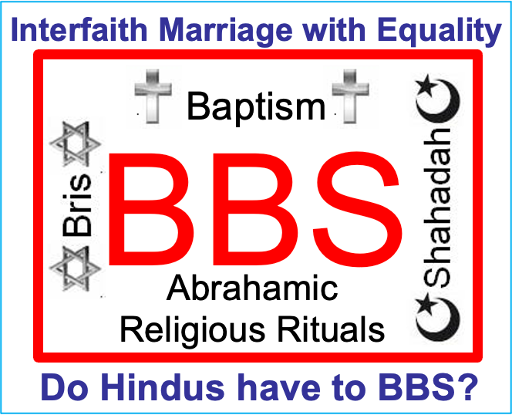
Beginning of uncomfortable moments
All along, Vijay thought that they had an agreement to raise children in two faiths, Judaism and Hinduism. However, Rachel later started referring to their children as Jewish-Indian instead of Jewish-Hindu. At the ages of 6 and 8, Rachel wanted to enroll the children in weekday Bar Mitzvah classes, on top of Jewish Sunday school. Rachel enrolled the children in a Hebrew school and Vijay in a Hindi language school.
[Author’s views: India is a secular country with many religions. Rachel did not address their children as Israeli-Indian (by countries) or Jewish-Hindu (by parents’ religions), but started addressing them as Jewish-Indian. Here, there is a valid concern by Vijay as it raises a yellow flag. Perhaps Rachel did not want her Jewish children to get confused by carrying dual religious identities.
The author has seen many Hindus (including their parents) go out of their way to please their interfaith spouse and merge with their spouse’s faith household activities. Though it is admirable of the Hindu party to be so open-minded, it becomes an issue when life transitions from initial ‘excitement for novelty’ to routine mundane life. After a few years, Vijay appears to lose interest in synagogue activities. Furthermore, Bar Mitzvah can be a major time commitment to family life for the next 5-8 years, and Vijay probably now realizes it is a huge commitment for both children and parents, and he has no reason to commit to it.]
Their interfaith marriage status was questioned!
Rachel’s attorney stated in court, “The fact that he twisted that and said they belonged to … two different religions, this man (Vijay) did not practice a moment of Hinduism during their marriage. That doesn’t mean that he doesn’t have the right to present Indian culture or any Hindu traditions he wants to, but to try and misrepresent what went on during this marriage is simply false and such misrepresentation is not fair.”
Later, when Vijay started introducing Hindu practices, the Jewish party found it “offensive.” The court papers read, “The fact that (Vijay) now attempts to find other formal religious training—a different religious institution every few years, is offensive. These children have been and are being raised Jewish.”
[Author’s views: Hinduism is not a dogmatic faith, and following certain set rules and practices is not mandatory to be a Hindu. Furthermore, it is okay for a Hindu to be an atheist (nastic), as long as one does good karma. Someone becoming more religious later in life should not be viewed as offensive to the other party.
To accept being part of a spouse’s Jewish faith wholeheartedly should not be construed by the court as that person now being less Hindu. Whatever the reason for Vijay’s enthusiasm for newly found exposure to Judaism (“what went on during this marriage”) does not mean he committed to Judaism for his life, especially when he has not converted to Judaism nor agreed to children’s Bar Mitzvah before or after the marriage.
It was wrong for the court to allow questioning of Vijay’s religiosity (“this man did not practice a moment of Hinduism during their marriage”) given he identified as Hindu, read Hindu epics to their kids, and did a daily meditation (Raja Yoga) practice himself. Furthermore, if Rachel wanted to now apply a stricter standard to Vijay, she herself acted in ways contrary to a strict interpretation of her religion, by having an interfaith civil wedding, naming her children after Hindu Gods, and agreeing to raise the children in both religions.
Earlier, the author asked a question to ten rabbis, including many conservative Jews, and all of them told him that they would not conduct a wedding where, along with the Jewish wedding, a Hindu wedding is also conducted. A conservative Jew may consider the Hindu vivaha (or a part of it) as idol-worshipping. Even the country Israel would consider Vijay-Rachel’s interfaith marriage illegal if conducted there. With all these pointers, Rachel’s conservative religiosity should have been questioned in that court, not only Vijay’s.
Here, the author clearly sees Vijay is at fault for not giving Rachel equal opportunity to be part of Hindu rituals during their early dating and married life. He gave her wrong expectations for what their married life would be like and till the end.
If Vijay shared his Hindu religious practices with Rachel with the same enthusiasm that Rachel did and from the first day, Rachel would have accepted that this is an ‘interfaith marriage with equality’ and may not have pressed too hard to raise children as Jewish. This could have helped to set right expectations (of true equality between two faiths) for the interfaith married life and may have averted the current split between the couple.
As said before, wrong expectations and implied understandings are major causes of pain in this couple’s life and now their children will have to pay the price for it.]
Rachel’s petition
Rachel said on their 5th date in India, “The boys would be raised Jewish. I would only have kids with someone who agreed that the kids would be raised Jewish. In addition to being raised Jewish, I am fine with you also giving them Hindu traditions.”
Rachel claimed he is an atheist, while she clarified that she is a practicing Jew. Vijay countered it by stating, “He never descried himself as an atheist–She was the one who said she didn’t believe in God.” They also agreed to take children to a Hindu temple. They had a civil wedding and a Jewish wedding contract, Ketubah. On Friday nights, they regularly lit the Shabbat candles and performed the blessings. They put their children in a Jewish preschool in a synagogue where they were registered members. They celebrated all Jewish holidays, where Vijay actively participated happily.
During the marriage, Vijay never took the children to a Hindu temple, but they did small things to expose them to ‘Indian’ culture. They had one Diwali dinner in 8 years.
[Author’s view: This is a very typical issue in most Hindu-Abrahamic relationships that the author has seen over the past 19 years. The main confusion here is the behavior of secular or pluralistic and non-dogmatic Hindus and its misinterpretation by the Abrahamic party (that the Hindu is buying into their exclusivist dogmas). The agreement “raising children as Jewish” (or in Islam or Christianity) does not take away from them being equally Hindu.
If Rachel clearly spelled out that children will NOT be Hindus, that is something Vijay would have understood and probably walked away from this relationship. Vijay being excited about all Jewish holidays does not make him a Jew and any less Hindu.
It is even okay for a Hindu to be an atheist (nastic), as long as one does good karma. Visiting a Hindu temple or celebrating all Hindu holidays is not mandatory in Hindu customs. Many times the author has seen the Hindu party actually get baptized (converted to Christianity) or take Shahadah (converted to Islam) without realizing that they are ‘not Hindu anymore’ in the eyes of laws. For naive Hindus, BBS means they are ‘adding’ a God, not ‘taking away’ any of their other Hindu Gods.
The Hindu pluralist concept is beyond comprehension for exclusivist Abrahamic. American Judges should be educated about it.
The author highly recommends to Abrahamic individuals considering dating a Hindu not to take a wrong message from the pluralist Hindu like Vijay, even if the Hindu agreed to convert to your faith. If Abrahamic individuals wish them to convert to be an exclusivist, clarify to them that they are NOT Hindu anymore (and confirm with their parents to avoid any confusion later).
Likewise, the author recommends all Dharmic individuals considering dating an Abrahamic to decline any BBS to find out if that person is a religious fanatic. If Abrahamic individuals will not accept each other’s BBS, why should Hindus have to submit to such exclusivist ideology? If BBS is more important to Abrahamic individuals than your true love, it should be a matter of concern. BBS is not devoid of meaning; it has clear legal consequences when you are in an American court presided by a Judeo-Christian judge.
Note: The author acknowledges that the BBS are holy rituals and have deep religious significance to Abrahamic individuals. He is making the above statements only to minimize confusion during dating, as happened between Vijay and Rachel here.]
Rachel’s understanding of the role of Hinduism in the family
Vijay felt Rachel was implying that the children are 100% Jewish. Rachel wanted the children to be Jewish, but she also said, “She never said the children were only Jewish or denied their Hinduism. She has always said they are both.” Furthermore, Rachel said, “Vijay, we always said the boys would be raised Jewish, in addition to Hindu if you desired.” Additionally, the court transcript reads, “He is going to do in terms of teaching the children these Hindu rituals, which she doesn’t object to,” and “My client (Rachel) never said that the children can’t be exposed to the Hindu religion, but these children have every right to be Jewish. They were born Jewish.”
[Author’s views: In an exclusivist’s mind, it is important to have children with only ‘one’ formal religion, but it is okay to allow them to be taught to respect other faiths. One rabbi explained it to the author this way: A Hindu-Jewish child should be considered to belong to Judaism but can be taught to respect Hinduism; like your home is Judaism and children should be taught to respect a guest (Hinduism) in their Jewish home. In short, it is a matter of settling for single ownership, not a joint venture!
Almost all Abrahamics (including Muslims and Christians) will not endorse the idea of raising children in TWO faiths. However, it is rarely observed in Dharmic (Hinduism, Jainism, Buddhism, and Sikhism) interfaith families to have a need to clearly identify which one of the two faiths the children will belong to. Raising children in both faiths is a common practice among most Dharmic interfaith couples.
The court understood and accepted Judaism as a matriarchal society (if the mother is Jewish, the children are Jewish), however, the court should have been educated that Hinduism (and Islam) follows the patriarchal system where children carry their father’s faith. In this case, the Judge should not have permitted this statement that “They were born Jewish” as a part of the motion in the court, because that may be applicable only if both parents were Jewish.
Does the court argument, “They were born Jewish,” apply also if the father was Muslim or Christian?]
Expectations from Jewish children
Rachel’s lawyer stated in court, “My client is Jewish. According to Jewish law (Mother being Jewish), that makes these children Jewish. There’s no question.”
The court paper further reads, “when you turn eight years old, you have to start attending Hebrew school, not Sunday school, not play; real Hebrew school, preparation toward your Bar Mitzvah” and “this synagogue has mandatory Hebrew school for a child who is eight years old starting his preparation for his Bar Mitzvah.”
Furthermore, Rachel’s attorney raised a concern, “the agreement said they could spend the Jewish holidays in their synagogue. But now he (Vijay) wants them to go somewhere else” and “The fact that (the Hindu) now attempts to find other formal religious training—a different religious institution every few years, is offensive.”
In the end, the Judged ruled, “It is clearly in the children’s best interest to be able to attend the Hebrew school. It is, as said, mandatory for them to make their Bat Mitzvah, and I’m not going to penalize the children” and “and I’ve determined that it is in their best interests to be able to attend mandatory religious classes as scheduled by the synagogue.”
[Author’s view: This statement in court is objectionable to the author, “According to Jewish law, that makes these children Jewish. There’s no question.” Why should there be no question? The Judeo-Christian judge, Abrahamic lawyers, and Rachel are expected to know this, but why is the court putting the burden of such knowledge on a naive Hindu? Is this what is expected from secular courts?
If Bar Mitzvah was a non-debatable and a must requirement for Rachel’s offspring, the question remains if she clearly explained in full detail to Vijay before going on the first date? If the truth was not disclosed upfront, Vijay should not be put in a position to accept consequences.
The court should have known that Bar Mitzvah was not a Jewish practice but was introduced later on. Even without the Bar Mitzvah, their interfaith children will be real Jews, as they are real Hindus without nama-samskara.
It is important to emphasize here that this is not a Jewish-Jewish marriage but an ‘interfaith’ marriage, and for this reason, it is wrong for the court to decide that Bar Mitzvah is in the best interest of the Hindu-Jewish children.]
The practical meaning of “Children will be Jewish ”
Rachel and her lawyers categorically denied they claimed the children would be 100% Jewish but never clarified if they would be 1%, 99% or in between Hindus.
If both parties were Abrahamic, ‘Jewish‘ would mean they cannot be Christian or Muslim (meaning no Baptism, Shahadah/sunat, etc.). However, the court needs to factor in the Hindu pluralistic mindset in this case.
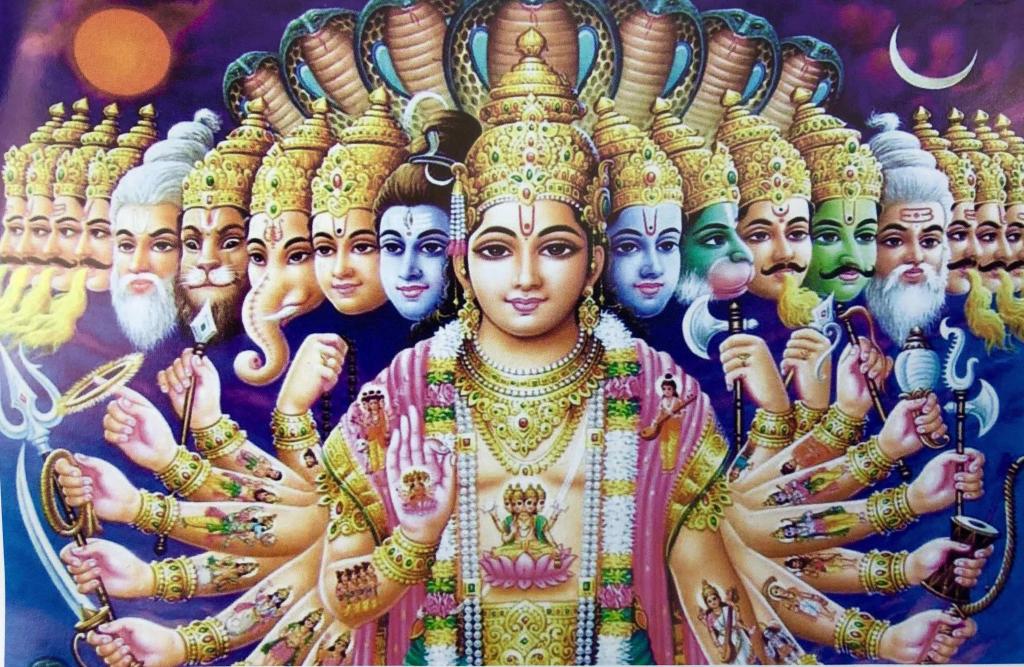
[Author’s views: Vijay (and his Hindu children), as a Hindu, can pray to Lord Rama one day, to Goddess Durga on the second day, to Jesus on the third, and all of them on the fourth day. On the fifth day, he can claim to be an atheist (nastic), and still, he is not any less Hindu than on the first day.
Let’s consider how much percent Jewish the children should be. To start with, the father is Hindu, thus it is unjust for any secular court to imply their children will be anything but 50-50 Hindu-Jewish. Their children have names from both faiths, thus reinforcing the 50-50 intention by the couple.
The children underwent (Bris) circumcision, which cannot be undone; therefore, from a Judeo-Christian viewpoint, they are considered 100% Jewish. Currently, the children are being given education from both faiths, and thus they are mixed, some percentage here and there, depending on which parent pushes hardest.
We do not know if the parents have decided, but in the case of an unfortunate incidence, if the child will have a final Jewish burial or Hindu cremation ritual (here you cannot have both, it has to be one or the other, 0% and 100%).
All these discussions will go on only until a child reaches the age of 18; later, children will be free to decide for their own faith or no faith. The more parents fight now to claim their rights to give them their own religion, the more chances children will lose interest in any faith.]
Commitment is not only for Judaism but also for the synagogue
In response to Vijay suggesting that Rachel enroll their children in a different nearby Hebrew school that would not have interfered with his parenting time, Rachel’s lawyer said, “That’s like saying if you’re a Baptist, you really should be in a Presbyterian (church), … her’s is a conservative Jewish synagogue, which he recommends, is reform.”
[Author’s views: Interfaith marriages are not for fundamentalists. If Bar Mitzvah, and that also only from a conservative synagogue, was very important to Rachel, a question remains: why did she not marry a conservative Jewish man? Her thought process for picking a Hindu man for life should have been questioned in this court.
If this Judge, lawyers, and Rachel do not know the difference between Shaivite and Vaishnavi Hindus, what is the point of talking about Baptist, Presbyterian, conservative-Jew, and reform-Jew in a case involving a Hindu? And why didn’t the judge even consider Vijay’s meditation practice, which is a known practice among all types of Hindus?
It is normal for a conservative to like a liberal as a life mate. Rachel must be thrilled in her early married life to find Vijay (super liberal) who was excited to be a part of all Jewish activities. However, by their nature, the liberals cannot be confined within certain conservative religious dogmas.
The court failed to recognize that wrong expectation was the fundamental issue between otherwise this beautiful couple.]
Teaching from Synagogue verses from a Guru
These statements were made in court about Vijay’s choice to take his children for Hindu religious education, “But now he wants them to go somewhere” and “He–apparently now he takes them–on Saturdays to somebody in New York to teach something about Hinduism.” About not having a ‘formal’ program in Hinduism in America, this was discussed in the court, “The fact that (the Hindu) now attempts to find other formal religious training—a different religious institution every few years, is offensive. These children have been and are being raised Jewish.”
[Author’s views: Hindus are small in number and thus don’t have Hindu educational centers or a Guru in every town in America. The court clearly understood the type of formal education given at synagogues but has created doubts against Vijay’s intentions simply because of their ignorance about Balvihar and the Hindu system of learning from a guru.
Why is introducing non-formal Hindu religious education programs later in life considered offensive? Even Rachel’s religiosity changed during their relationship period, so why did Vijay lose his rights to go back to his roots?]
Meditation is not a religious ritual
The court paper reads, “Meditation is important for relaxation, et cetera. It’s not necessarily–it’s not a religious ritual” and “It’s healthy to do meditation. As said, it’s (meditation) not a religious ritual.”
[Author’s views: One of the most fundamental teachings in the Holy Gita is Yoga (not the physical exercise of downward dog, but union with the Divine). Hindus have many options available to connect (yoga) with God, and meditation (Raja Yoga) is one of the four options (the others being Bhakti, Karma, and Gnana Yoga). It is believed that meditation alone could lead to nirvana.
It is wrong for this court to allow such hurtful arguments to Hindu sentiments, claiming that meditation is not a religious ritual but only for relaxation or health reasons. This shows there is a clear need to educate American judges about Hinduism before taking a case involving a Hindu.]
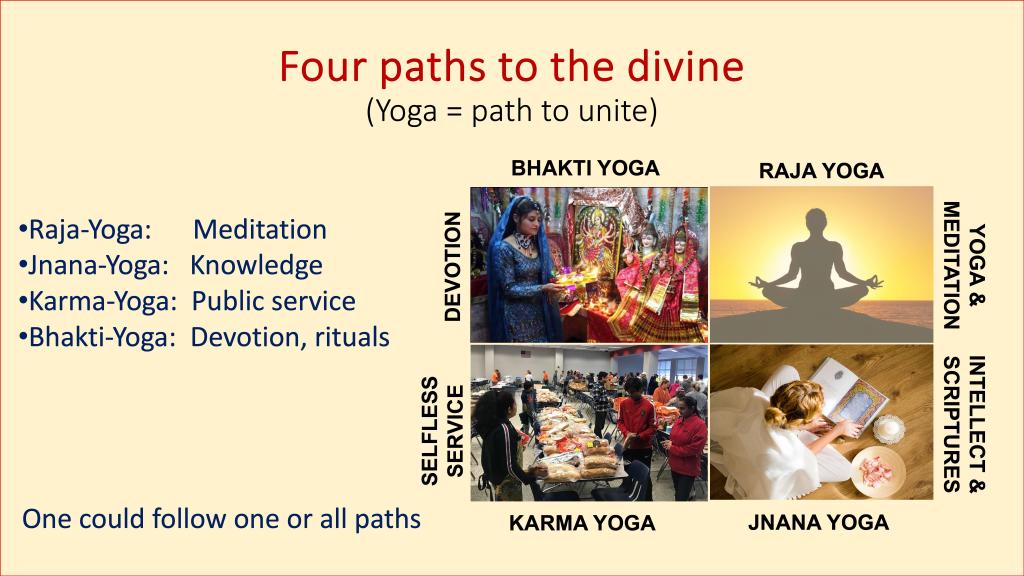
Time commitments for religious education
The court transcript reads, “When you turn eight years old, you have to start attending Hebrew school, not Sunday school, not play; real Hebrew school, preparation toward your Bar Mitzvah.” The judge concluded, “I’ve determined that it is in their best interests to be able to attend mandatory religious classes as scheduled by the synagogue” and “The issue was the religion. The issue was not the fact that he may lose the two hours. It clearly was made in bad faith.”
[Author’s views: Normal American youths are busy with their school studies, baseball, piano, swimming competitions, and more. If they are Jewish, they may have to spare time to go through about 5-8 years of preparation for their Bar Mitzvah (learning Hebrew, chanting of Torah and Haftarah tropes, study of Torah, composition of a D’var Torah, etc.). On top of that, it is just fair if Vijay may wish to have his children spend an equal amount of time for Hindu religious education as well.
The author sees the issue was with the timing and time commitment for Bar Mitzvah and not with the religion or the ritual. If Bar Mitzvah was a matter of a total 3 hour ceremony, like the Bris, the author doesn’t think Vijay will go to a court to stop it. Vijay had no problem with Hebrew schooling for Bar Mitzvah via a private tutor or another synagogue at a different time.
When the judge in Vijay-Rachel’s case made this judgment, “It is clearly in the children’s best interest to be able to attend Hebrew school,” the author wishes the judge had also talked directly to these kids to see if they wish to have some spare time left in their lives to enjoy some non-religious relaxation time with their friends, before deciding what is in the best interest of children.
Parents should keep in mind that an overload of religious education can sometimes have a negative impact on children’s personal faith(s).]
Two-hours scheduling discussion in this case
Rachel wanted to use two hours of Vijay’s allocated weekday time (which he was using for meditation with his children) for the children’s Bar Mitzvah classes and instead proposed giving partial replacement time during summer break, which was not acceptable or convenient for Vijay, so he declined. The author has skipped all those lengthy discussions here.
What will they do when the synagogue education conflicts with Hinduism’s teachings?
[Author’s views: During Bar Mitzvah training, the children will learn to commit to following the 613 mitzvot (commandments) based on the Torah for their lives. What if any of these teachings are in conflict with the teachings of Hinduism? Will Vijay have the liberty to provide clarification to his own Hindu children? Will he get in legal trouble again for interfering with someone’s internal religious matter and be accused of acting “in bad faith” again?
Three of the 613 mitzvot are listed here (read the full list here):
Mitzvah #2: Not to even think that there are other gods besides Him [Do Lord Krishna, Ganesh, and Goddess Lakshmi count as other gods?]
Mitzvah #51: Not to bow down before a smooth stone [most Hindu Gods, including Shiva Linga, are made to smooth stone.]
Mitzvah #162: Not to marry non-Jews [Why should these interfaith children be restricted to pick their life mate only from Jews, especially when their mother did not follow this mitzvah?]
The court’s final judgments
The judge ruled against Vijay, prioritizing Rachel’s religious activity over his, and declared him to be in bad faith. Remarks by the judge included:
- “… the parties came together and practiced Judaism together, and he practiced what he wanted to in the Hindu faith also.”
[Authors’ views: Vijay did not marry Rachel to “come together and practice Judaism,” but he simply respected her faith.
Rachel gave it in writing that, “Vijay, we always said the boys would be raised Jewish, in addition to Hindu if you desired,” but the judge ignored such written understanding.
Pluralist Vijay clearly missed out on the exclusive nature of his marriage where Judaism was to be shared while Hinduism was limited to himself only.]
- “It is clearly in the children’s best interest to be able to attend the Hebrew school. It is, as said, mandatory for them to make their Bat Mitzvah, and I’m not going to penalize the children,” and “and I’ve determined that it is in their best interests to be able to attend mandatory religious classes as scheduled by the synagogue.”
[Author’s views: All discussions of Jewish norms should not be factored in here when she herself did not follow all Jewish norms to get married. The court has not considered the fact in the final judgment that this is not a Jew-Jew but an ‘interfaith’ marriage. In such a situation, it is wrong to say it is “mandatory” for children to go through Bar Mitzvah, especially when the equal other partner has concerns. Will this court come to the same conclusion (about Bar Mitzvah being mandatory) if the other party was Muslim or Christian?
The author agrees here that Vijay has not given an equal opportunity to expose his children to Hindu culture, and thus the children will be more comfortable with their Jewish friends.
Those liberal Hindus who go out of their way to be a part of a spouse’s faith should know that your pluralistic kindness could work against you in court.]
- “I believe that the (Vijay’s) application in this case was made in bad faith” and “The issue was the religion. The issue was not the fact that he may lose the two hours. It clearly was made in bad faith.”
- “the only resolution he wanted is that the children couldn’t go to the Hebrew school to make their Bar Mitzvah. I think that was made in bad faith. So, I am going to order counsel fees and costs for the necessity of filing the response.”
-
[Author’s views: As said before, the author sees the issue was with the timing and time commitment for Hebrew school for Bar Mitzvah and not with the religion or the ritual. If Bar Mitzvah was a matter of a total 3-hour ceremony, like the Bris, the author doesn’t think Vijay will go to court to stop it.
Rachel never clarified explicitly during early dating time with Vijay that Bar Mitzvah is a non-negotiated ‘a must’ requirement for her. Rachel herself is not a real conservative Jew because 1) she married a ‘Hindu’ (not a Person of the Book; it is against Mitzvah #162, 2) at one point she said, “She didn’t believe in God,” 3) willingly gave both her children Hindu names that are names for Hindu Gods (contrary to the very first of the Ten Commandments), and 4) she believes children can be raised in something other than Judaism and they can be BOTH, Hindu and Jewish. Check with a rabbi to confirm if her views are norms for a conservative Jew.
Would the judge conclude “in bad faith” if the other party was a Muslim wishing to take children to some madrasa somewhere or a Baptist-Christian wishing to Baptize these Jewish-Baptist children, especially when they agreed to raise children in both faiths?
The author believes it was wrong to conclude Vijay acted in bad faith.]
Lessons learned for interfaith couples
-
-
- Before saying “I do,” always consider the possibility of facing a legal battle for child custody. How can you prepare for such a situation in advance?
- Conversion for marriage is a wrong practice. Interfaith couples should have a prenuptial agreement in writing, stating that there will be no BBS (Baptism, Bris, or Shahadah) unless they genuinely believe in the new faith and are willing to convert even if the relationship ends. No BBS a good insurance against a love-proselytizer.
- Marriages are made in heaven, but they can also end in hell. Promise less but produce more. Avoid creating unrealistic expectations for your partner.
-
Disclosure: The author, a scientist by training and not a legal expert, aims to provide educational insights into the legal implications of interfaith relationships. The quotes provided may originate from the plaintiff or defendant’s attorney, or presiding judge during court proceedings. They are presented here without clarification or full context. They are a part of the court discussions leading to the final judgment.
A must-read materials for dating Hindu-Jewish couples: Joseph-Rebecca court battle over baptizing a Jewish daughter, Hindu-Jewish Marriage, Bar Mitzvah for Hindus, Torah, Conversion for marriage, 15 FAQs, Marriage Laws, Circumcision, book: Interfaith Marriage, book: Hindu-Muslim Marriage.
If readers are aware of other similar legal cases, please cite them below as a comment (go all the way bottom), and the author will consider writing about them.


